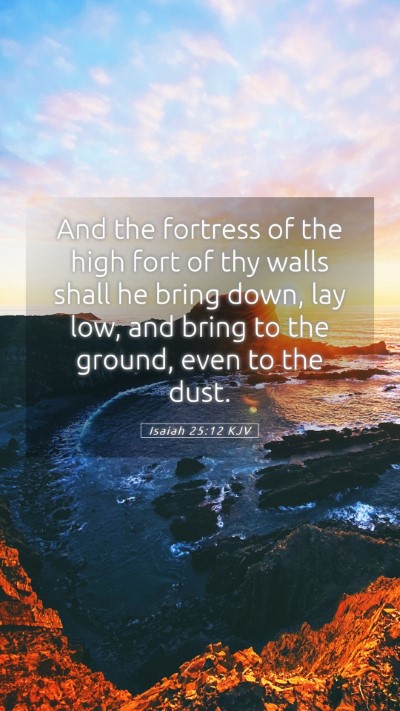Understanding Isaiah 25:12
Bible Verse: Isaiah 25:12 (KJV) - "And the fortress of the high fort of thy walls shall he bring down, lay low, and bring to the ground, even to the dust."
Bible Verse Meanings
The interpretation of this verse can be understood through the lens of both the immediate and broader context of Isaiah's prophecies. This verse symbolizes the destruction of the strongholds and defenses of those opposed to God. It illustrates a divine judgment against the proud and the mighty.
Bible Verse Interpretations
Isaiah's prophecy often encapsulates themes of hope and destruction. The phrase "fortress of the high fort" signifies that even the strongest defenses will not withstand God's judgment. This can serve as a reminder of the futility of human pride against divine authority.
Insights from Public Domain Commentaries
-
Matthew Henry:
Henry emphasizes that this verse illustrates the fall of the mighty cities and the downfall of the proud among the nations. He interprets the laying low of the fortress as a prophetic sign of God's ultimate control over earthly powers and a call for humility.
-
Albert Barnes:
Barnes points out that the reference to the fortress and walls indicates security and strength that will inevitably fall under God's judgment. He stresses that no power can stand against God's purposes, which will be accomplished regardless of human efforts.
-
Adam Clarke:
Clarke elaborates on the imagery of destruction, indicating that this is metaphorical for God's judgment upon those who trust in their own strength rather than in Him. The dust mentioned symbolizes total desolation, ensuring that all trust in human fortifications will come to naught.
Scripture Analysis
Isaiah 25:12 fits into the larger narrative of Isaiah, a book characterized by dual themes of judgment and redemption. In analyzing this verse, it becomes clear that God's sovereignty over the nations is paramount, and His power is absolute. Through this lens, believers are encouraged to find security in God's everlasting kingdom rather than transient worldly structures.
Biblical Exegesis
Examining Isaiah 25:12 within the framework of biblical exegesis reveals much about the character and nature of God. The destruction of fortresses signals the end of arrogance and rebellion against God. It invites readers to reflect on their own lives, questioning what fortifications they might rely on instead of God's provision and strength.
Application to Daily Life
This verse prompts a profound personal reflection: Are there areas in our lives where we rely on our 'fortresses'—be it status, wealth, or personal achievements? Isaiah calls believers to dismantle these and turn towards God, the true source of strength and security.
Bible Cross References
- Jeremiah 49:16 - A reminder of the pride that comes before destruction.
- Isaiah 2:11-12 - The day of the Lord's judgment against human pride.
- Psalm 37:20 - Assurance that the wicked will perish, while those who trust in the Lord will be secure.
Conclusion
Isaiah 25:12 serves as a poignant reminder of God’s authority over human affairs and the certainty of His judgment. It encourages believers to examine their reliance on worldly securities and to reaffirm their trust in God as the true and lasting stronghold. The insights gleaned from public domain commentaries highlight the richness of this verse's meaning and its relevance in our spiritual journey.
This verse is essential for anyone engaged in Bible study groups, seeking Bible study insights, or interested in Bible verse commentary. It provides a profound understanding of Scripture that can enrich Bible study lessons and cultivate a deeper personal faith.


